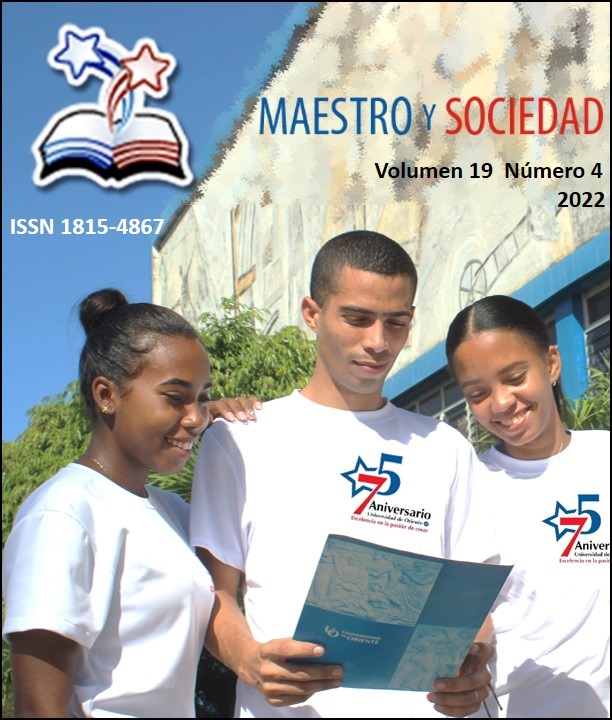Organización integrada de los componentes funcionales desde las disciplinas de la carrera Español-Literatura
Integrated organization of the functional components from the disciplines of the Spanish-Literature career
Palavras-chave:
componentes funcionales, eje transversal, organización epistemográfica, functional components, transversal axis, epistemographic organizationResumo
En el artículo se socializan los resultados derivados de la metodología para la organización integrada de los componentes funcionales de la lengua como parte de la formación investigativa del estudiante de Licenciatura en Educación Español- Literatura. Se parte de considerar que el eje transversal de las disciplinas. Los resultados de la observación participante, la entrevista en profundidad y el criterio de expertos, permitieron comprobar la eficacia de la metodología y reconocer los avances significativos que benefician a las aspiraciones investigativas plasmadas en el modelo del profesional. En su realización fueron empleados métodos teóricos, empíricos y estadísticos que permitieron recopilar y analizar la información necesaria para explicar la problemática existente y proponer una metodología como vías para su solución.
In the article, the results derived from the methodology for the integrated organization of the functional components of the language are socialized as part of the investigative training of the student of the Bachelor of Education in Spanish-Literature. It starts from considering that the transversal axis of the disciplines. The results of the participant observation, the in-depth interview and the expert criteria, allowed us to verify the effectiveness of the methodology and recognize the significant advances that benefit the investigative aspirations embodied in the professional model. In its realization, theoretical, empirical and statistical methods were used that allowed the collection and analysis of the necessary information to explain the existing problem and propose a methodology as ways to solve it.
Referências
Barrera, A.D. (2014). La clase de Español- Literatura. Sus particularidades en la secundaria básica. En: Introducción a la didáctica de la lengua y la literatura. Editorial Pueblo y Educación.
Bernaza, G.J., Toitiño, D.M. y López, Z. S. (2018). La superación profesional: mover ideas y avanzar más. Ministerio de Educación Superior. Universidad de Artemisa. https://www.researchgate.net
Cisneros, S., Bonnane, Y. & Moreira, C. (2020). La orientación didáctica a la inferencia en preuniversitario. Niveles de ayuda. EduSol, 20(71), 144-157. http://scielo.sld.cu/scielo
Cisneros, S., Hernández, C.M., Aranda, B.L., Céspedes, A., Vinent, M.B. (2021). Concepciones y buenas prácticas en didácticas particulares. Editorial Universo Sur. https://universosur.ucf.edu.cu
Díaz, J., Savón, C. y Marrero, H. (2012). La evaluación del aprendizaje en la asignatura lengua española desde la integración de los componentes lingüísticos. Revista Didascalia. Vol. III. Número 4. Disponible en: https://revistas.ult.edu.cu
Domínguez, I., Roméu, A., Pírez, B., Fontanills, Y., Cisneros, S. y Otero, Y. (2018). El texto científico. Algunas consideraciones para la comunicación de la ciencia. La Habana: Editorial Félix Varela.
Felipe, Y., Figueroa, E., Ramos, AA. (2019). Formación epistemográfica. Una aproximación a la práctica. Revista EduSol, 19(Núm. Especial). http://edusol.cug.co.cu
García, J., González, I. y Rodríguez, A. (2021). Las estrategias curriculares en la formación integral del profesional universitario. Atenas, Vol. 2 (54), 204 - 217. http://atenas.umcc.cu
Piedad, N. (2022). Metodología para desarrollar la competencia textual en la creación de textos escritos. Revista Maestro y Sociedad. https://maestroysociedad.uo.edu.cu
Sarmiento, Y. (2022). Orientación didáctica de la metaescritura en la formación inicial del profesor de Español-Literatura. Revista Maestro y Sociedad. https://maestroysociedad.uo.edu.cu
Selene, C. (2022). Estrategias didáctico-metodológicas para el fortalecimiento del pensamiento crítico en los estudiantes universitarios. Revista Maestro y Sociedad. https://maestroysociedad.uo.edu.cu
Vargas, Y. (2010). Concepción didáctica de la integración de los componentes funcionales en el proceso de enseñanza-aprendizaje de la asignatura Lengua Española en el tercer grado de la escuela primaria. [Tesis de Doctorado en Ciencias Pedagógica. ISP “Frank País García”].
Publicado
Como Citar
Edição
Seção
Licença
Copyright (c) 2022 Yusmila Felipe-Puebla, Eufemia Figueroa-Corrales, Alejandro Arturo Ramos-Banteurt

Este trabalho está licenciado sob uma licença Creative Commons Attribution-NonCommercial-NoDerivatives 4.0 International License.
Esta revista proporciona un acceso abierto inmediato a su contenido, basado en el principio de que ofrecer al público un acceso libre a las investigaciones ayuda a un mayor intercambio global de conocimiento. Cada autor es responsable del contenido de cada uno de sus artículos. Los artículos pueden ser inéditos o estar disponibles previamente en servidores de preprints reconocidos por la revista. Sin embargo, no se permite la duplicación de la publicación o traducción de un artículo ya publicado en otra revista o como capítulo de un libro.
This journal provides immediate open access to its content, based on the principle that providing the public with free access to research supports a greater global exchange of knowledge. Each author is responsible for the content of each of their articles. Articles may be previously unpublished or available on preprint servers recognized by the journal. However, duplication of publication or translation of an article already published in another journal or as a book chapter is not permitted.
Esta revista oferece acesso aberto imediato ao seu conteúdo, com base no princípio de que oferecer ao público acesso gratuito à pesquisa contribui para um maior intercâmbio global de conhecimento. Cada autor é responsável pelo conteúdo de cada um de seus artigos. Os artigos poderão ser inéditos ou estar previamente disponíveis em servidores de preprints reconhecidos pela revista. No entanto, não é permitida a duplicação de publicação ou tradução de artigo já publicado em outro periódico ou como capítulo de livro.



























 Universidad de Oriente
Universidad de Oriente 